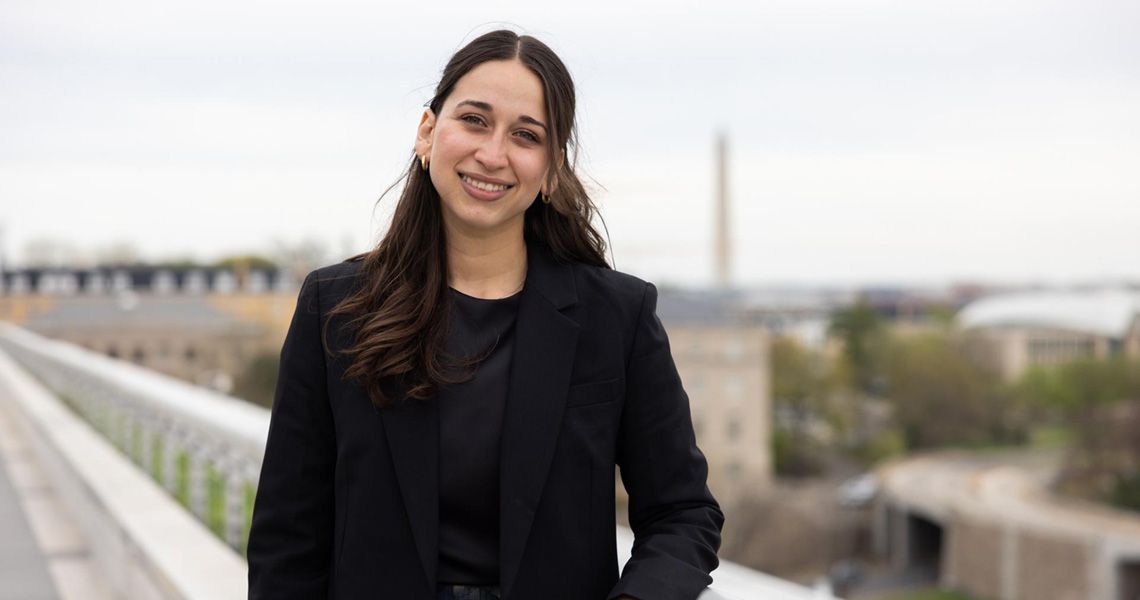For as long as she can remember, Natalia Anzaldúa’s favorite word has been “why.” As a little girl first in Monterrey, Mexico, and then later in McAllen, Texas, she would question why things that were always done a certain way couldn’t be changed to be more inclusive and welcoming in a new way. So much so that she sometimes wore the label of “troublemaker.”
But as a doctoral student in occupational therapy at the George Washington University School of Medicine and Health Sciences, where she will be a part of the program’s first-ever graduating cohort next month, Anzaldúa’s self-described “trouble-making” tendencies of asking questions were not only tolerated but encouraged.
So, when applications opened to be the student speaker at GW’s Commencement on the National Mall, she asked herself, “Why not?”
Months later, she got her answer. The university selected her to address her peers in the Class of 2025 on Sunday, May 18, on the National Mall at GW’s signature event for graduating seniors—with Washington, D.C.’s monuments serving as the backdrop.
The news rendered even the ever-inquisitive Anzaldúa a tad speechless.
“I kept envisioning myself on that stage, wondering, ‘Could that actually be me?’ So, when I heard my name, I was like, ‘what?!’ I was so excited,” she said. “I immediately thought about all the people I had talked to about my speech and how I couldn’t wait to thank them. Their support wasn’t for nothing. It’s just been so exciting.”
From the moment she interviewed at GW’s newly formed occupational therapy doctoral program, Anzaldúa thought this would be a place where she could reach untapped potential. She appreciated questions that made her reflect on her values and think back to clinical experiences that challenged her.
“It made me feel like GW wasn’t just a place to learn content—it was a place to grow,” she said. “That really resonated with me.”
She also appreciated playing a part in building the occupational therapy program and curriculum from the ground up, and she has great pride in being a part of its first graduating class. Anzaldúa, who obtained her undergraduate degree in kinesiology from St. Edward’s University in Austin, Texas, was drawn to occupational therapy because of its ability to work with and support people to pursue whatever is meaningful to them. She is passionate about collaborating with people to live their lives to the fullest by enabling them to engage in meaningful activities that are important to them.
Anzaldúa saw that passion come to fruition at GW when she was asked to become involved in developing the first-ever accessibility hour at the 2023 White House Easter Egg Roll, spending months with faculty and students from SMHS programs to analyze the sensory-friendly activities that would be provided at the annual event on the South Lawn. As she saw the warmth of disabled and non-disabled children, as well as their families, being able to engage in Easter-themed activities, she saw just what a difference she could make.
“I felt extremely proud to be a part of history and seeing parents with disabilities be able to play and engage in the activities provided by the White House as well as see the children enjoy themselves and the activity with support from GW occupational, physical and speech therapy student volunteers,” she said. “The children and families expressed comfort and safety knowing GW graduate students were there to support their family.”
It was in this moment Anzaldúa, who has also voiced accessibility concerns to policymakers on Capitol Hill, realized she can be the person she learned about in school or had seen on TV. She could that person who creates history and makes change, which is what she will look to do as she hopes to work with children and families with disabilities, especially Spanish-speaking families.
Throughout her life, Anzaldúa has learned to embrace her duality of United States and Mexican cultures, which has allowed her to become an open-minded person while also sparking her curiosity. “GW really leaned into that,” she said.
Anzaldúa will lean into that herself when she takes the mic at Commencement, where she intends to make her speech accessible to all as she encourages her audience to be curious and, most importantly, feel empowered to be themselves.
“I want them to ask, ‘Why am I doing this?’ and be curious and intentional about their paths,” Anzaldúa said. “I’m not saying, ‘Do this or do that.’ I’m saying: be authentic, be inclusive, be helpful. Just be you.”



